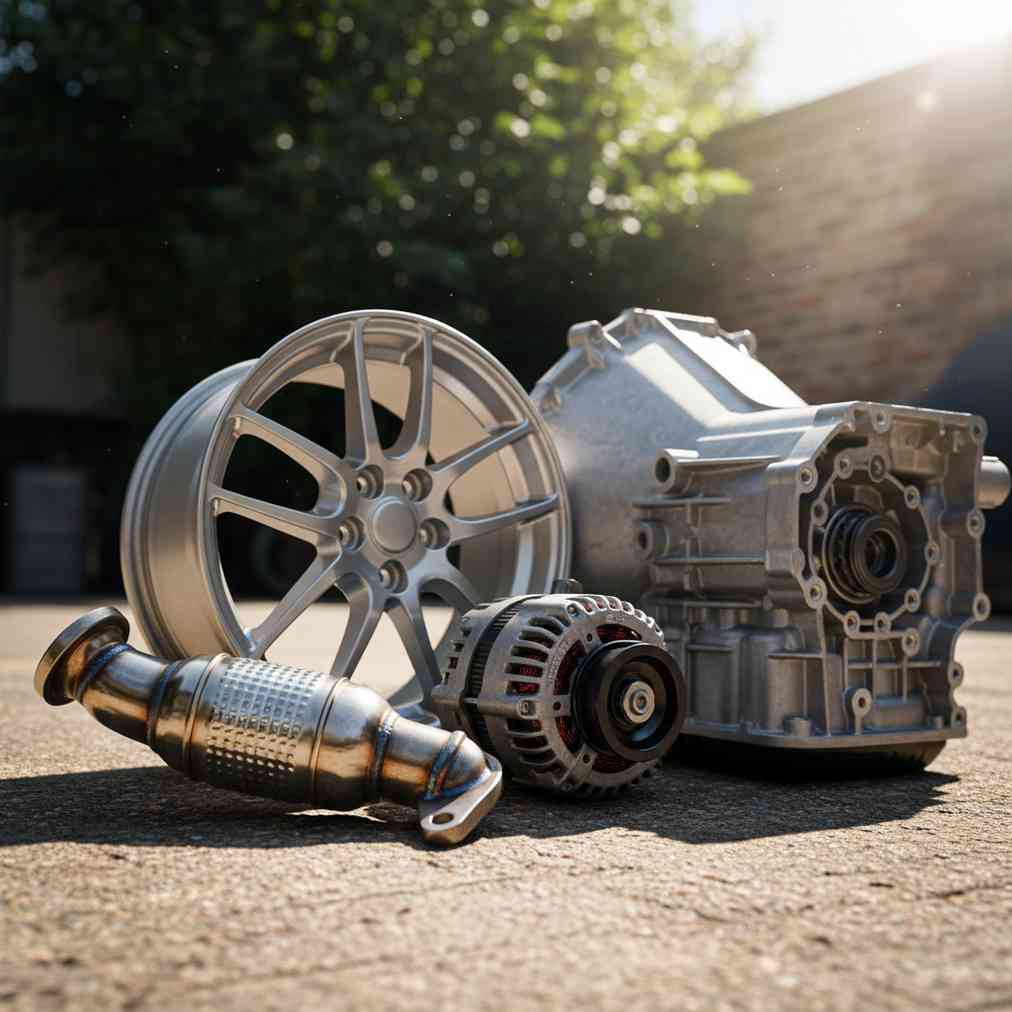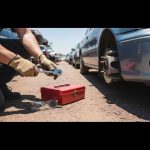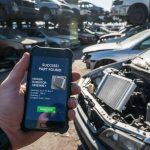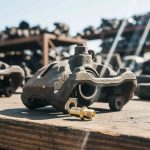Selling a car that’s no longer roadworthy can feel like a daunting task, but understanding its true value as a “junk car” can turn a potential eyesore into a source of cash. The worth of a junk vehicle isn’t a fixed number; it’s influenced by a variety of factors, from the raw materials it’s made of to the condition of its individual components. This guide will help you navigate these factors to estimate your junk car’s value.
Key Factors Determining Junk Car Value
Several elements come into play when determining how much a junk car is worth. Buyers, whether they are auto salvage yards or specialized “cash for cars” services, will consider these points to make their offer:
Weight and Scrap Metal Prices
The primary value of a junk car often lies in its metal content. Heavier vehicles, such as trucks and SUVs, generally have more steel and aluminum, leading to a higher scrap value compared to smaller sedans. Current scrap metal prices fluctuate based on global demand, economic conditions, and supply issues. As of 2025, scrap rates per ton range from approximately $155 to $205 in the U.S., with a national average of around $180 per ton. This means a typical mid-size car weighing around 3,750 pounds could fetch between $280 to $375 in scrap value alone.
Make, Model, and Year
While a car’s age and model can influence its desirability for parts, some makes and models are more sought after than others due to their reputation for reliability and the availability of their parts. Newer junk cars may also be worth more as they are often easier to repair and resell. Popular models like Honda Civics, Toyota Camrys, and Ford F-150s often have strong demand for their parts.
Vehicle Condition and Salvageable Parts
The overall condition of the car significantly impacts its value. A vehicle that is still operational or has major components in good working order will command a higher price than one that is heavily damaged or stripped. Key parts that can significantly boost a junk car’s value include:
- Engine and Transmission: These are often the most valuable components, especially if they are still functional or can be rebuilt.
- Catalytic Converter: Due to the precious metals (platinum, palladium, rhodium) they contain, catalytic converters can be worth anywhere from $50 to $450.
- Wheels and Tires: Alloy wheels and tires in good condition can add to the car’s value.
- Battery and Alternator: While less valuable than engines, functioning batteries and alternators can still add some worth.
- Electronics and Control Modules: Modern cars have valuable electronic components that are often sought after in the used parts market.
Even if the car is not drivable, intact major components can be salvaged and sold separately, potentially fetching two to three times the value of selling the car whole.
Completeness of the Vehicle
A complete vehicle with all its metal components intact will generally fetch a higher price than one that has been partially dismantled or stripped of valuable parts. Complete vehicles are easier for salvage yards to process and maximize their profit from.
Location and Market Demand
Geographical location can influence a junk car’s value. Areas with more competition among salvage yards or higher local demand for certain car models or parts may offer better rates. Proximity to salvage markets can also reduce transportation costs for buyers, potentially increasing the offer.
Title and Paperwork
Having a clear title and all necessary documentation can streamline the selling process and may positively influence the offer you receive. Proper paperwork reduces legal complications for buyers.
Current Market Trends and Statistics
As of 2025, scrap metal prices for complete vehicles typically range from $155 to $717.50, depending on weight and the current market rates per ton, which average around $180. While this establishes a base scrap value, individual junk cars can be worth considerably more if they have valuable parts or are in a condition that allows for resale.
The demand for used auto parts remains strong, partly due to supply chain issues affecting new parts availability, making components like engines, transmissions, and catalytic converters particularly valuable. Rising scrap car prices make it an excellent time to sell an old vehicle.
| Vehicle Component | Estimated Value Range | Condition Requirements |
|---|---|---|
| Catalytic Converter | $50 – $450 | Intact, not damaged |
| Engine (Working) | $500 – $2,000 | Functional or rebuildable |
| Transmission | $300 – $1,500 | Good working condition |
| Alloy Wheels (Set) | $200 – $800 | No cracks or damage |
| Airbags | $100 – $300 each | Undeployed |
| GPS Navigation System | $150 – $400 | Working condition |
How to Maximize Your Junk Car’s Value
Industry professionals emphasize the importance of research and comparison when selling a junk car. Understanding the intricacies of junk car pricing is critical, as market conditions and demand for parts play significant roles.
Research and Compare Offers
Use online junk car value calculators and compare offers from multiple reputable buyers. Don’t settle for the first offer you receive – understanding how scrap car prices are calculated can help you negotiate better deals.
Be Honest About Condition
Transparency about your car’s condition, including any damage or missing parts, builds trust and leads to a fairer offer. Avoiding scams starts with honest communication.
Consider Selling Parts Separately
If you have the time and resources, dismantling the car and selling high-value parts individually can potentially yield significantly more money than selling the car whole. Focus on valuable components like:
- Working engines and transmissions
- Catalytic converters
- Electronic control modules
- Premium wheels and tires
- Undeployed airbags
Prepare Your Vehicle for Sale
Remove personal belongings and clean the car. Many buyers offer free towing, so confirm this as part of the deal. Having your title and registration ready speeds up the process.
Where to Sell Your Junk Car
You have several options when it comes to selling your junk vehicle:
- Local Salvage Yards: Auto salvage yards are often your best bet for competitive pricing
- Cash for Cars Services: These companies specialize in buying junk cars quickly
- Scrap Metal Dealers: Best for vehicles with minimal salvageable parts
- Online Buyers: Convenient but may offer lower prices due to transportation costs
What Makes a Car “Junk”?
A car is typically considered junk when:
- Repair costs exceed the vehicle’s value
- It’s no longer safe or legal to drive
- It has extensive damage from accidents or flooding
- Major systems have failed (engine, transmission, etc.)
- It’s reached the end of its useful life
Even if your car falls into one of these categories, it can still have significant value. Flood-damaged cars, for example, may still have valuable parts that weren’t affected by water damage.
Recent Developments in the Junk Car Market
The automotive recycling industry continues to evolve, with a growing emphasis on sustainability and maximizing the value of end-of-life vehicles. Companies are increasingly utilizing advanced valuation tools and networks to offer competitive prices for junk cars.
Electric vehicle adoption is also changing the landscape, as EV batteries and components can be extremely valuable. The demand for recycled auto parts is on the rise, driven by cost savings for consumers and environmental considerations.
“Understanding the intricacies of junk car pricing is critical. Market conditions and demand for parts play significant roles in determining value.”
Common Mistakes to Avoid
When selling your junk car, avoid these common pitfalls:
- Accepting the first offer: Always get multiple quotes
- Not removing valuable parts first: Consider selling high-value components separately
- Forgetting to cancel insurance: Don’t pay for coverage on a sold vehicle
- Not having proper documentation: Ensure you have the title and registration
- Ignoring local regulations: Some areas have specific requirements for junk car sales
Environmental Benefits of Junking Your Car
Selling your junk car to a reputable auto recycler provides significant environmental benefits:
- Prevents harmful fluids from leaking into soil and groundwater
- Reduces demand for new metal production
- Keeps usable parts in circulation longer
- Properly disposes of hazardous materials
- Reduces landfill waste
You might even consider donating your car to charity for additional tax benefits while supporting a good cause.
Final Thoughts on Junk Car Values
Your junk car’s value depends on multiple factors, from its weight in scrap metal to the condition of its individual components. While the base scrap value provides a minimum estimate, vehicles with working parts or popular components can be worth significantly more.
Take time to research current market values, get multiple quotes, and consider whether selling parts individually might maximize your return. Remember that even a car that seems worthless likely has some value – whether for scrap metal, salvageable parts, or both.
The key to getting the best price for your junk car is understanding what makes it valuable and finding the right buyer who can maximize that value. Whether you choose a local salvage yard, an online buyer, or decide to part it out yourself, being informed about your vehicle’s worth puts you in the best position to negotiate a fair deal.





Leave a Reply
You must be logged in to post a comment.